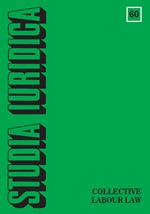The Autonomous Labour Law – de lege lata and de lege ferenda
The Autonomous Labour Law – de lege lata and de lege ferenda
Author(s): Krzysztof W. BaranSubject(s): Law, Constitution, Jurisprudence
Published by: Wydawnictwa Uniwersytetu Warszawskiego
Keywords: autonomous labour law; sources of law; collective labour agreement; accords of non-individual nature; trade union; non-union representations; work councils; public sector; freedom of collective bargaining; collective rights; individual employment relation
Summary/Abstract: The notion of autonomous labour law is usually used to cover all sources of law not enumerated in Art. 87 of the Polish Constitution. However, in the opinion of the author, it should be reserved only for accords of non-individual nature concluded by entities representing employees and the employer(s), especially for collective labour agreements (CLAs). The CLAs (and other accords concluded between the employer and the trade unions) are the main topic of this paper. The first problem is the proposal to extend the CLA-related freedom. At present, it is largely the monopoly of trade unions. The author suggests that the extend the right to conclude CLAs be extended to non-union representative-bodies, especially taking into account work councils. The next problem is the range of groups of employees are covered by CLAs. It is, in opinion of the author, definitely too broad. The CLAs should be allowed also in entities of the public (governmental) sector. The provisions of Art. 59 par. 2 of the Constitution of the Republic of Poland and the freedom of collective bargaining are applicable also to employees of the public sector. The third problem raised by the author is the enforcement of collective rights through court. There should exist a legal possibility for a trade union that is a party to a CLA to file a suit against the employer to labour court. The next issues considered by the author are the problem of the “transfer” of provisions of CLAs to an individual employment relationship and the lack of rules for making amendments in CLAs and for terminating them. The author makes also some comments as to the status of the autonomous sources of labour law (especially CLAs and other accords concluded between the employer and the trade unions) in the hierarchy of the sources of law. In the opinion of the author, their importance will gradually increase. Achieving that may be possible in particular through deregulation and changes making statutory law, which restricts the freedom of collective bargaining, more flexible.
Journal: Studia Iuridica
- Issue Year: 2015
- Issue No: 60
- Page Range: 11-25
- Page Count: 15

